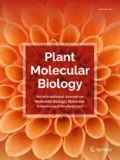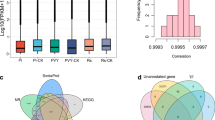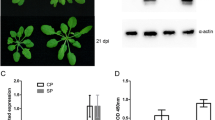Abstract
Key message
Through large-scale transcriptional data analyses, we highlighted the importance of plant metabolism in plant immunity and identified 26 metabolic pathways that were frequently influenced by the infection of 14 different pathogens.
Abstract
Reprogramming of plant metabolism is a common phenomenon in plant defense responses. Currently, a large number of transcriptional profiles of infected tissues in Arabidopsis (Arabidopsis thaliana) have been deposited in public databases, which provides a great opportunity to understand the expression patterns of metabolic pathways during plant defense responses at the systems level. Here, we performed a large-scale transcriptome analysis based on 135 previously published expression samples, including 14 different pathogens, to explore the expression pattern of Arabidopsis metabolic pathways. Overall, metabolic genes are significantly changed in expression during plant defense responses. Upregulated metabolic genes are enriched on defense responses, and downregulated genes are enriched on photosynthesis, fatty acid and lipid metabolic processes. Gene set enrichment analysis (GSEA) identifies 26 frequently differentially expressed metabolic pathways (FreDE_Paths) that are differentially expressed in more than 60% of infected samples. These pathways are involved in the generation of energy, fatty acid and lipid metabolism as well as secondary metabolite biosynthesis. Clustering analysis based on the expression levels of these 26 metabolic pathways clearly distinguishes infected and control samples, further suggesting the importance of these metabolic pathways in plant defense responses. By comparing with FreDE_Paths from abiotic stresses, we find that the expression patterns of 26 FreDE_Paths from biotic stresses are more consistent across different infected samples. By investigating the expression correlation between transcriptional factors (TFs) and FreDE_Paths, we identify several notable relationships. Collectively, the current study will deepen our understanding of plant metabolism in plant immunity and provide new insights into disease-resistant crop improvement.





Similar content being viewed by others
References
Ahuja I, Kissen R, Bones AM (2012) Phytoalexins in defense against pathogens. Trends Plant Sci 17:73–90. doi:10.1016/j.tplants.2011.11.002
Asano T, Kimura M, Nishiuchi T (2012) The defense response in Arabidopsis thaliana against Fusarium sporotrichioides. Proteome Sci 10:61. doi:10.1186/1477-5956-10-61
Ascencio-Ibanez JT, Sozzani R, Lee TJ, Chu TM, Wolfinger RD, Cella R, Hanley-Bowdoin L (2008) Global analysis of Arabidopsis gene expression uncovers a complex array of changes impacting pathogen response and cell cycle during geminivirus infection. Plant Physiol 148:436–454. doi:10.1104/pp.108.121038
Barrett T et al (2013) NCBI GEO: archive for functional genomics data sets—update. Nucleic Acids Res 41:D991–D995. doi:10.1093/nar/gks1193
Bennett RN, Wallsgrove RM (1994) Secondary metabolites in plant defence mechanisms. New Phytol 127:617–633. doi:10.1111/j.1469-8137.1994.tb02968.x
Bilgin DD, Zavala JA, Zhu JIN, Clough SJ, Ort DR, DeLucia EH (2010) Biotic stress globally downregulates photosynthesis genes. Plant Cell Environ 33:1597–1613. doi:10.1111/j.1365-3040.2010.02167.x
Bolton MD (2009) Primary metabolism and plant defense—fuel for the fire. Mol Plant Microbe Interact 22:487–497. doi:10.1094/mpmi-22-5-0487
Brazma A et al (2003) ArrayExpress–a public repository for microarray gene expression data at the EBI. Nucleic Acids Res 31:68–71. doi:10.1093/nar/gkg091
Choi C, Park YH, Kwon SI, Yun C, Ahn I, Park SR, Hwang D-J (2014) Identification of AtWRKY75 as a transcriptional regulator in the defense response to Pcc through the screening of Arabidopsis activation-tagged lines. Plant Biotechnol Rep 8:183–192. doi:10.1007/s11816-013-0308-x
Clay NK, Adio AM, Denoux C, Jander G, Ausubel FM (2009) Glucosinolate metabolites required for an Arabidopsis innate immune response. Science 323:95–101. doi:10.1126/science.1164627
Clifton R, Millar AH, Whelan J (2006) Alternative oxidases in Arabidopsis: A comparative analysis of differential expression in the gene family provides new insights into function of non-phosphorylating bypasses. Biochim Biophys Acta 1757:730–741. doi:10.1016/j.bbabio.2006.03.009
Consortium GO (2004) The Gene Ontology (GO) database and informatics resource. Nucleic Acids Res 32:D258–D261. doi:10.1093/nar/gkh036
De Coninck B et al (2005) Arabidopsis AtcwINV3 and 6 are not invertases but are fructan exohydrolases (FEHs) with different substrate specificities. Plant Cell Environ 28:432–443. doi:10.1111/j.1365-3040.2004.01281.x
Dong J, Chen C, Chen Z (2003) Expression profiles of the Arabidopsis WRKY gene superfamily during plant defense response. Plant Mol Biol 51:21–37. doi:10.1023/A:1020780022549
Dong X, Jiang Z, Peng Y-L, Zhang Z (2015) Revealing shared and distinct gene network organization in Arabidopsis immune responses by integrative analysis. Plant Physiol 167:1158–1185. doi:10.1104/pp.114.254292
Eisen MB, Spellman PT, Brown PO, Botstein D (1998) Cluster analysis and display of genome-wide expression patterns. Proc Natl Acad Sci U S A 95:14863–14868
El Hadrami A, Adam LR, El Hadrami I, Daayf F (2010) Chitosan in plant protection. Mar Drugs 8:968–987. doi:10.3390/md8040968
Eulgem T (2005) Regulation of the Arabidopsis defense transcriptome. Trends Plant Sci 10:71–78. doi:10.1016/j.tplants.2004.12.006
Faith JJ et al (2007) Large-scale mapping and validation of Escherichia coli transcriptional regulation from a compendium of expression profiles. PLoS Biol 5:e8. doi:10.1371/journal.pbio.0050008
Fan M et al. (2014) The bHLH transcription factor HBI1 mediates the trade-off between growth and pathogen-associated molecular pattern–triggered immunity in Arabidopsis. Plant Cell. doi:10.1105/tpc.113.121111
Ferrari S, Plotnikova JM, De Lorenzo G, Ausubel FM (2003) Arabidopsis local resistance to Botrytis cinerea involves salicylic acid and camalexin and requires EDS4 and PAD2, but not SID2, EDS5 or PAD4. Plant J 35:193–205. doi:10.1046/j.1365-313X.2003.01794.x
Frerigmann H, Glawischnig E, Gigolashvili T (2015) The role of MYB34, MYB51 and MYB122 in the regulation of camalexin biosynthesis in Arabidopsis thaliana. Front Plant Sci 6:654. doi:10.3389/fpls.2015.00654
Gautier L, Cope L, Bolstad BM, Irizarry RA (2004) Affy—analysis of Affymetrix GeneChip data at the probe level. Bioinformatics 20:307–315. doi:10.1093/bioinformatics/btg405
Ghanta S, Chattopadhyay S (2011) Glutathione as a signaling molecule: another challenge to pathogens. Plant Signal Behav 6:783–788. doi:10.4161/psb.6.6.15147
Gigolashvili T, Berger B, Mock HP, Muller C, Weisshaar B, Flugge UI (2007) The transcription factor HIG1/MYB51 regulates indolic glucosinolate biosynthesis in Arabidopsis thaliana. Plant J 50:886–901. doi:10.1111/j.1365-313X.2007.03099.x
Grant JJ, Yun BW, Loake GJ (2000) Oxidative burst and cognate redox signalling reported by luciferase imaging: identification of a signal network that functions independently of ethylene, SA and Me-JA but is dependent on MAPKK activity. Plant J 24:569–582. doi:10.1046/j.1365-313x.2000.00902.x
Hanqing F, Kun S, Mingquan L, Hongyu L, Xin L, Yan L, Yifeng W (2010) The expression, function and regulation of mitochondrial alternative oxidase under biotic stresses. Mol Plant Pathol 11:429–440. doi:10.1111/j.1364-3703.2010.00615.x
He F, Yoo S, Wang D, Kumari S, Gerstein M, Ware D, Maslov S (2016) Large-scale atlas of microarray data reveals the distinct expression landscape of different tissues in Arabidopsis. Plant J 86:472–480. doi:10.1111/tpj.13175
Heilmann I, Mekhedov S, King B, Browse J, Shanklin J (2004) Identification of the Arabidopsis palmitoyl-monogalactosyldiacylglycerol ∆7-desaturase gene FAD5, and effects of plastidial retargeting of Arabidopsis desaturases on the fad5 mutant phenotype. Plant Physiol 136:4237–4245. doi:10.1104/pp.104.052951
Hok S, Danchin EG, Allasia V, Panabieres F, Attard A, Keller H (2011) An Arabidopsis (malectin-like) leucine-rich repeat receptor-like kinase contributes to downy mildew disease. Plant Cell Environ 34:1944–1957. doi:10.1111/j.1365-3040.2011.02390.x
Hong F, Breitling R, McEntee CW, Wittner BS, Nemhauser JL, Chory J (2006) RankProd: a bioconductor package for detecting differentially expressed genes in meta-analysis. Bioinformatics 22:2825–2827. doi:10.1093/bioinformatics/btl476
Hu J et al (2013) Heterogeneity of tumor-induced gene expression changes in the human metabolic network. Nat Biotechnol 31:522–529. doi:10.1038/nbt.2530
Hull R (2002) Virus Infection, Plant. In: Encyclopedia of Molecular Biology. Wiley, Hoboken. doi:10.1002/047120918X.emb1662
Huot B, Yao J, Montgomery BL, He SY (2014) Growth-defense tradeoffs in plants: a balancing act to optimize fitness. Mol Plant 7:1267–1287. doi:10.1093/mp/ssu049
Jiang Z, Dong X, Li Z-G, He F, Zhang Z (2016a) Differential coexpression analysis reveals extensive rewiring of Arabidopsis gene coexpression in response to Pseudomonas syringae infection. Sci Rep 6:35064. doi:10.1038/srep35064
Jiang Z, Dong X, Zhang Z (2016b) Network-based comparative analysis of Arabidopsis immune responses to Golovinomyces orontii and Botrytis cinerea infections. Sci Rep 6:19149. doi:10.1038/srep19149
Jin J, Zhang H, Kong L, Gao G, Luo J (2014) PlantTFDB 3.0: a portal for the functional and evolutionary study of plant transcription factors. Nucleic Acids Res 42:D1182–D1187. doi:10.1093/nar/gkt1016
Jones JDG, Dangl JL (2006) The plant immune system. Nature 444:323–329. doi:10.1038/nature05286
Kai K et al (2008) Scopoletin is biosynthesized via ortho-hydroxylation of feruloyl CoA by a 2-oxoglutarate-dependent dioxygenase in Arabidopsis thaliana. Plant J 55:989–999. doi:10.1111/j.1365-313X.2008.03568.x
Kilian J et al (2007) The AtGenExpress global stress expression data set: protocols, evaluation and model data analysis of UV-B light, drought and cold stress responses. Plant J 50:347–363. doi:10.1111/j.1365-313X.2007.03052.x
Kim S-J et al (2004a) Functional reclassification of the putative cinnamyl alcohol dehydrogenase multigene family in Arabidopsis. Proc Natl Acad Sci U S A 101:1455–1460. doi:10.1073/pnas.0307987100
Kim SJ et al (2004b) Functional reclassification of the putative cinnamyl alcohol dehydrogenase multigene family in Arabidopsis. Proc Natl Acad Sci U S A 101:1455–1460. doi:10.1073/pnas.0307987100
Kliebenstein DJ (2012) Plant defense compounds: systems approaches to metabolic analysis. Annu Rev Phytopathol 50:155–173. doi:10.1146/annurev-phyto-081211-172950
Kliebenstein DJ, Rowe HC, Denby KJ (2005) Secondary metabolites influence Arabidopsis/Botrytis interactions: variation in host production and pathogen sensitivity. Plant J 44:25–36. doi:10.1111/j.1365-313X.2005.02508.x
La Camera S et al (2009) The Arabidopsis patatin-like protein 2 (PLP2) plays an essential role in cell death execution and differentially affects biosynthesis of oxylipins and resistance to pathogens. Mol Plant Microbe Interact 22:469–481. doi:10.1094/MPMI-22-4-0469
Less H, Angelovici R, Tzin V, Galili G (2011) Coordinated gene networks regulating Arabidopsis plant metabolism in response to various stresses and nutritional cues. Plant Cell 23:1264–1271. doi:10.1105/tpc.110.082867
Li H, Zhang Z (2016) Systems understanding of plant-pathogen interactions through genome-wide protein-protein interaction networks. Front Agr Sci Eng 3:102–112. doi:10.15302/j-fase-2016100
Lohman KN, Gan S, John MC, Amasino RM (1994) Molecular analysis of natural leaf senescence in Arabidopsis thaliana. Physiol Plant 92:322–328. doi:10.1111/j.1399-3054.1994.tb05343.x
Lv Q, Cheng R, Shi T (2014) Regulatory network rewiring for secondary metabolism in Arabidopsis thaliana under various conditions. BMC Plant Biol 14:180. doi:10.1186/1471-2229-14-180
Maere S, Heymans K, Kuiper M (2005) BiNGO: a Cytoscape plugin to assess overrepresentation of Gene Ontology categories in biological networks. Bioinformatics 21:3448–3449. doi:10.1093/bioinformatics/bti551
Malinovsky FG et al (2014) Antagonistic regulation of growth and immunity by the Arabidopsis basic helix-loop-helix transcription factor homolog of brassinosteroid enhanced expression interacting with increased leaf inclination binding bHLH1. Plant Physiol 164:1443–1455. doi:10.1104/pp.113.234625
Margis-Pinheiro M, Martin C, Didierjean L, Burkard G (1993) Differential expression of bean chitinase genes by virus infection, chemical treatment and UV irradiation. Plant Mol Biol 22:659–668
Meng S, Torto-Alalibo T, Chibucos MC, Tyler BM, Dean RA (2009) Common processes in pathogenesis by fungal and oomycete plant pathogens, described with Gene Ontology terms. BMC Microbiol 9:S7. doi:10.1186/1471-2180-9-s1-s7
Moore JW, Loake GJ, Spoel SH (2011) Transcription dynamics in plant immunity. The Plant Cell 23:2809–2820. doi:10.1105/tpc.111.087346
Mueller LA, Zhang P, Rhee SY (2003) AraCyc: A biochemical pathway database for Arabidopsis. Plant Physiol 132:453–460. doi:10.1104/pp.102.017236
Pandey SP, Roccaro M, Schon M, Logemann E, Somssich IE (2010) Transcriptional reprogramming regulated by WRKY18 and WRKY40 facilitates powdery mildew infection of Arabidopsis. Plant J 64:912–923. doi:10.1111/j.1365-313X.2010.04387.x
Piasecka A, Jedrzejczak-Rey N, Bednarek P (2015) Secondary metabolites in plant innate immunity: conserved function of divergent chemicals. New Phytol 206:948–964. doi:10.1111/nph.13325
Pieterse CMJ, Does DVd, Zamioudis C, Leon-Reyes A, Wees SCMV (2012) Hormonal modulation of plant immunity. Annu Rev Cell Dev Biol 28:489–521. doi:10.1146/annurev-cellbio-092910-154055
Povero G et al (2011) Transcript profiling of chitosan-treated Arabidopsis seedlings. J Plant Res 124:619–629. doi:10.1007/s10265-010-0399-1
Rojas CM, Senthil-Kumar M, Tzin V, Mysore K (2014) Regulation of primary plant metabolism during plant-pathogen interactions and its contribution to plant defense. Front Plant Sci 5:17. doi:10.3389/fpls.2014.00017
Saga H et al (2012) Identification and characterization of ANAC042, a transcription factor family gene involved in the regulation of camalexin biosynthesis in Arabidopsis. Mol Plant Microbe Interact 25:684–696. doi:10.1094/MPMI-09-11-0244
Saisho D, Nambara E, Naito S, Tsutsumi N, Hirai A, Nakazono M (1997) Characterization of the gene family for alternative oxidase from Arabidopsis thaliana. Plant Mol Biol 35:585–596. doi:10.1023/a:1005818507743
Sanchez-Vallet A, Ramos B, Bednarek P, Lopez G, Pislewska-Bednarek M, Schulze-Lefert P, Molina A (2010) Tryptophan-derived secondary metabolites in Arabidopsis thaliana confer non-host resistance to necrotrophic Plectosphaerella cucumerina fungi. Plant J 63:115–127. doi:10.1111/j.1365-313X.2010.04224.x
Schlaeppi K, Abou-Mansour E, Buchala A, Mauch F (2010) Disease resistance of Arabidopsis to Phytophthora brassicae is established by the sequential action of indole glucosinolates and camalexin. Plant J 62:840–851. doi:10.1111/j.1365-313X.2010.04197.x
Shannon P et al (2003) Cytoscape: a software environment for integrated models of biomolecular interaction networks. Genome Res 13:2498–2504. doi:10.1101/gr.1239303
Sokal RR (1958) A statistical method for evaluating systematic relationships. Univ Kans Sci Bull 38:1409–1438.
Subramanian A et al (2005) Gene set enrichment analysis: A knowledge-based approach for interpreting genome-wide expression profiles. Proc Natl Acad Sci U S A 102:15545–15550. doi:10.1073/pnas.0506580102
Taguchi G, Ubukata T, Nozue H, Kobayashi Y, Takahi M, Yamamoto H, Hayashida N (2010) Malonylation is a key reaction in the metabolism of xenobiotic phenolic glucosides in Arabidopsis and tobacco. Plant J 63:1031–1041. doi:10.1111/j.1365-313X.2010.04298.x
Tsuda K, Somssich IE (2015) Transcriptional networks in plant immunity. New Phytol 206:932–947. doi:10.1111/nph.13286
van Wees SC, Chang HS, Zhu T, Glazebrook J (2003) Characterization of the early response of Arabidopsis to Alternaria brassicicola infection using expression profiling. Plant Physiol 132:606–617. doi:10.1104/pp.103.022186
Vanlerberghe GC (2013) Alternative oxidase: a mitochondrial respiratory pathway to maintain metabolic and signaling homeostasis during abiotic and biotic stress in plants. Int J Mol Sci 14:6805–6847. doi:10.3390/ijms14046805
Wagner U, Edwards R, Dixon DP, Mauch F (2002) Probing the Diversity of the Arabidopsis glutathione S-Transferase Gene Family. Plant Mol Biol 49:515–532. doi:10.1023/a:1015557300450
Yilmaz A, Mejia-Guerra MK, Kurz K, Liang X, Welch L, Grotewold E (2011) AGRIS: the Arabidopsis gene regulatory information server, an update. Nucleic Acids Res 39:D1118–D1122. doi:10.1093/nar/gkq1120
Zeier J (2013) New insights into the regulation of plant immunity by amino acid metabolic pathways. Plant Cell Environ 36:2085–2103. doi:10.1111/pce.12122
Zhou N, Tootle TL, Glazebrook J (1999) Arabidopsis PAD3, a gene required for camalexin biosynthesis, encodes a putative cytochrome P450 monooxygenase. Plant Cell 11:2419–2428
Acknowledgements
We thank Dr. Yuan Zhou at Peking University for helpful discussion on this topic.
Funding
This work was supported by Beijing Natural Science Foundation (5172021) and the National Natural Science Foundation of China (31471249).
Author contributions
ZJ designed the study, performed the analyses and drafted the manuscript. ZZ and FH revised the manuscript. ZZ supervised the study.
Author information
Authors and Affiliations
Corresponding author
Ethics declarations
Conflict of interest
The authors declare that they have no conflicts of interest.
Electronic supplementary material
Below is the link to the electronic supplementary material.
Rights and permissions
About this article
Cite this article
Jiang, Z., He, F. & Zhang, Z. Large-scale transcriptome analysis reveals arabidopsis metabolic pathways are frequently influenced by different pathogens. Plant Mol Biol 94, 453–467 (2017). https://doi.org/10.1007/s11103-017-0617-5
Received:
Accepted:
Published:
Issue Date:
DOI: https://doi.org/10.1007/s11103-017-0617-5




